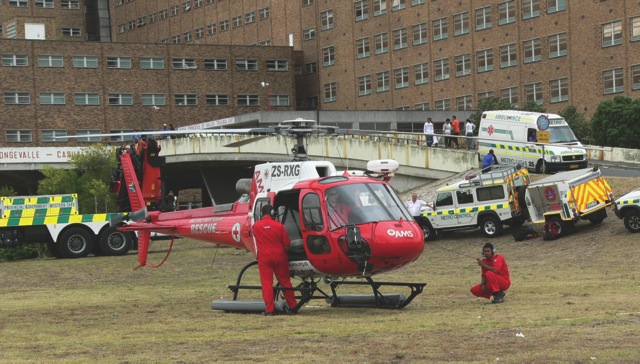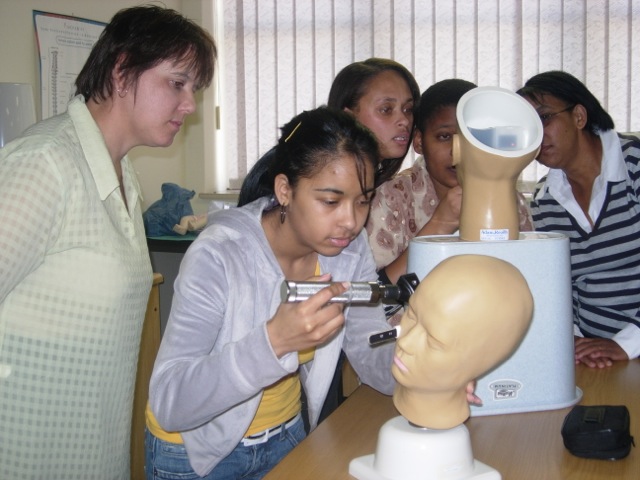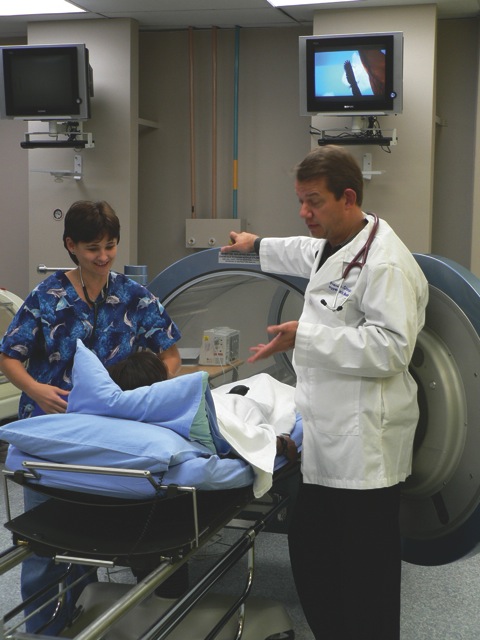Violence, Injuries, Trauma, and Rehabilitation
??????
The Division of Emergency Medicine
 The Division of Emergency Medicine is committed to the education and training of specialist registrars who are supported by a formal academic programme, a mentoring programme, an ongoing evaluation system and final examination preparation support.
The Division of Emergency Medicine is committed to the education and training of specialist registrars who are supported by a formal academic programme, a mentoring programme, an ongoing evaluation system and final examination preparation support.
Undergraduate students at both universities are exposed to emergency medicine teaching. Emergency ultrasound proficiency has become a requirement for the final exit examination and an emergency ultrasound rotation has been developed this year supported by a VLE component.?
Due to the expansion of the Division's activities, the Emergency Care Institute South Africa has been created. The Institute plans to cover all essential aspects of emergency medicine, including education and training and outreach into other African countries (including Botswana, Madagascar and Uganda). These are proving to be exciting times for emergency medicine in the region, and this emerging speciality is fast becoming a vital foundation for health care in South Africa.
The Centre for Rehabilitation Studies
The Centre for Rehabilitation Studies offers a unique postgraduate programme to health professionals, including doctors, nurses, speech and occupational therapists, physiotherapists, social workers, etc. The approach is interdisciplinary, with emphasis on development of leadership skills to facilitate development, management and evaluation and research into appropriate and cost effective rehabilitation and disability programmes.
The Division of Speech-Language and Hearing Therapy
The Division of Speech-Language and Hearing Therapy educates and trains health professionals to perform the following professional functions in the field of speech-language and hearing therapy:
- Prevention, identification, assessment and treatment of communication disorders;
- Counselling of persons with communication disorders and their significant others;
- Consultation in the field of communication disorders;
- Research into communication disorders;
- Education and training of related professionals or relevant lay persons; and
- Management of programmes provided by speech-language and hearing therapists to clients with communication disorders in health, education and government contexts.
The Division of Physiotherapy?
 One of the research focus areas of the Division of Physiotherapy is spinal research. There has been an increased awareness of the relationship between computer use and high levels of body aches and pains among adolescents.
One of the research focus areas of the Division of Physiotherapy is spinal research. There has been an increased awareness of the relationship between computer use and high levels of body aches and pains among adolescents.
Computer use is becoming more common in South African schools due to the government's initiative to increase tuition via computers as a means to increase the educator capacity in schools and to boost careers in science and technology.?
However if prolonged sitting, due to computer use, occurs during a critical period of skeletal growth in the vertebral column then damage to the spinal structures can occur. Its series of school spinal health projects aim to investigate and prevent the development of spinal muscular and skeletal dysfunction among students using computers.
The Department of Nursing and Midwif?ery
The Department of Nursing and Midwifery is dedicated to create and sustain an environment in which knowledge can be discovered, shared and applied for the benefit of the nursing profession and the community.
 It is committed to excellence in nursing practice, scholarship and leadership, which is supported by our primary research focus area: Patient Centred Care, with subdivisions to Intimate Partner Violence and Continuous Quality Improvement.?
It is committed to excellence in nursing practice, scholarship and leadership, which is supported by our primary research focus area: Patient Centred Care, with subdivisions to Intimate Partner Violence and Continuous Quality Improvement.?
Although it is acknowledged that many nurses across the health care industry epitomize leadership in nursing, we believe that nurses who embark on research are uniquely positioned to contribute to leadership in nursing through their research or education. The masters and doctoral programmes are therefore designed to equip nurses to discover new knowledge and apply this knowledge to change practice and improve patient care.
The Division of Occupational Therapy?
The postgraduate courses of the Division of Occupational Therapy provide opportunities to qualified occupational therapists to further their qualifications in the focus areas of management, research, paediatrics or work rehabilitation.
 The Stellenbosch 肆客足球 Baromedicine and Occupational Medicine Facility
The Stellenbosch 肆客足球 Baromedicine and Occupational Medicine Facility
The Stellenbosch 肆客足球 Baromedicine & Occupational Medicine Facility (SUBOMF) consists of a Sechrist 3200E and a Hyox hyperbaric system that can treat up to 8 patients per day. The facility also offers specialized diving-, aviation- and occupational medical examinations. The facility is one of two in the Western Cape that is able to offer hyperbaric oxygen (HBO) to the local community.
The Pharmacology and Toxicology Laboratory
The activities of the Division of Pharm?acology? are supported by a routine Phar?macology/Toxicology laboratory which provides an all-hour analytical service.
Although the Tygerberg Academic Hospital is still the most frequent user of this service, it is accessible to all the hospitals, health care facilities and agencies (e.g. private pathology services, rehabilitation centres and so forth) in the Cape Peninsula that have a need for qualitative or quantitative data on xenobiotics (medicinal agents, drugs of abuse and toxic as well as potentially toxic xenobiotics). ?
Service requests from the private sector show an ever-escalating tendency and, since the greater part of these requests is emergency-related, depend heavily on the reliable all-hour service that is provided.
The Poison Information Centre
The Poison Information ?Centre provides an all hour Pharmacology/Toxicology Consultation Service to health care professionals (at all levels), industry, and the lay public.
Although the service primarily provides in the needs of the Western Cape Province and neighbouring regions, demands to meet national requirements have been increasing steadily over the past years.?
A similar cross-border tendency is evident, and service interaction with other countries on the African continent continues to escalate.
?
??



